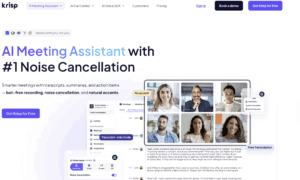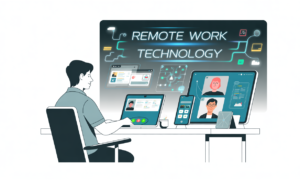What do employees think about this remote work surveillance practice? While businesses may have a positive intent behind their implementation into the work dynamic, those being monitored might feel otherwise. However, since this practice has become essential in remote work, businesses have also responded and shifted their operating methods to take advantage of several aspects.
Nonetheless, employees often have a say in remote work surveillance in workspaces. Concerned authorities have conducted interviews and surveys with remote employees to understand their perspectives on improving these monitoring policies.
The growing application of remote work surveillance
The widespread use of remote work has led companies to shift their focus to surveillance solutions to monitor employees. In 2023, the Electronic Frontier Foundation produced a report stating that there has been a 50% surge in the usage of employee monitoring tools since the pandemic began. Remote monitoring software like Insightful offers comprehensive employee productivity monitoring tools necessary to track work hours, application usage, online activities, and so on.
However, while the tools are helpful from the employer’s point of view, they also pose particular concerns regarding employees’ trust and privacy. Many remote employees commented on the feeling of uneasiness with constant surveillance, which often results in erosion of the autonomy that remote work provides.
Employee concerns about remote work surveillance
A high number of remote employees express worries about being constantly monitored.
Privacy invasion
Workers often feel that remote work surveillance infringes on their privacy. Unlike conventional office environments, remote work promotes personal workspaces, generating the idea of intrusive monitoring. Even though monitoring tools like Insightful claim to track only work-related activities, employees may still be concerned about the invasion of personal time or the accidental exposure of their private data.
Employees have often expressed discomfort with webcam monitoring and keystroke logging, as they constantly scrutinize their activities. One respondent said, “It feels like I am being watched every minute, and it is hard to focus when I know someone could be surveilling and analyzing my every move.”
Erosion of trust
Remote work surveillance can strain the trust and relationship between employees and employers. While trust is a foundational component of any relationship, consistent monitoring can create a sense of distrust, making workers less likely to work effectively independently.
It is common for employees to perceive using surveillance tools as the employer’s lack of confidence in their working capacity with time management or task completion within deadlines without supervision. This interpretation of intentions results in decreased job satisfaction, ultimately impacting productivity.
Psychological impact
Another concerning aspect of remote work surveillance is its effect on the mental health of the employees. Continuous surveillance generates a sense of stress and pressure, which may result in a common phenomenon termed the “Hawthorne effect,” where workers tend to change their behavior as they are aware of being watched. This may improve productivity, but it can also burn out the employees due to overtime.
Additionally, the awareness of being tracked for every move makes them hesitant to take breaks and overexert themselves, leading to declined well-being. This work dynamic of constant vigilance affects the quality of work-life balance, which is one of the core advantages of the remote work model. One remote worker has shared his ordeal: “The pressure of knowing I am being watched 24/7 is overwhelming. It affects me psychologically, and I am constantly stressed about meeting expectations.”
Suggestions to improve remote work surveillance policies
Given employees’ legitimate concerns, employers should take responsibility for applying remote work surveillance fairly transparently and respect privacy. Below are a few suggestions to improve monitoring policies to facilitate a positive work environment.
Transparency and communication
One of the frequently mentioned concerns was the need for more transparency. Employees want to know why and what data is collected and how it will be used. Clear communication regarding the monitoring policies can alleviate these concerns and build trust. Employers should also offer detailed explanations of the surveillance tools being used and encourage employees to submit questions or concerns. Also, continually updating the staff on any changes in the monitoring practices helps maintain a positive working relationship.
Prioritize outcomes, not activity
Employees have suggested that companies focus more on outcomes than tracking every keystroke or time spent on specific activities. By analyzing work performance based on outcomes, employers can provide the autonomy that employees desire while also being productive.
This strategy fits the results-oriented work environments (ROWEs) concept, where workers are deduced based on their achievements instead of the time spent working. Workforce has mentioned that embracing the ROWE mindset reduces extra stress associated with remote work surveillance.
Opt-in monitoring for specific tasks
Another popular suggestion was administering opt-in monitoring policies for particular tasks instead of blanket surveillance. For instance, those working on sensitive projects requiring close supervision can opt into surveillance for those tasks only. This approach enables employees to protect their privacy for less critical activities while ensuring accountability.
Regular feedback and involvement
Several remote employees have emphasized the need for periodic feedback and involvement in developing company monitoring policies. Employers are advised to seek marginal contributions from their workforce when designing or changing monitoring practices to ensure that those policies align with the employees’ demands and concerns. Providing immediate feedback based on the monitoring data of their performance allows employees to be aware of what they lack and how they can improve without feeling overly scrutinized.
Closure
Ultimately, remote work surveillance is a controversial and complex topic. While particular concerns prevail, not every employee presumes remote monitoring negatively. Some view it as an essential tool to measure accountability and fairness across remote teams. On the other side, employers can reap undeniable benefits from it while considering the employees’ perspective on the matter. By addressing these concerns, enterprises can create a supportive monitoring culture that facilitates productivity and well-being.



































